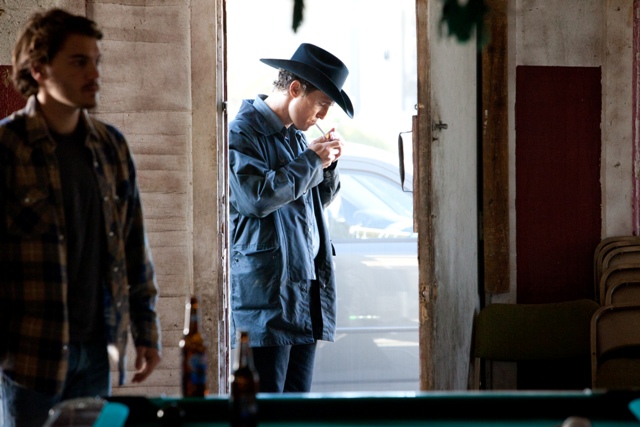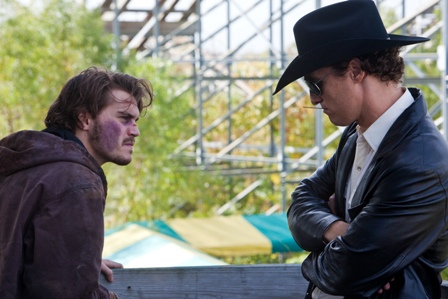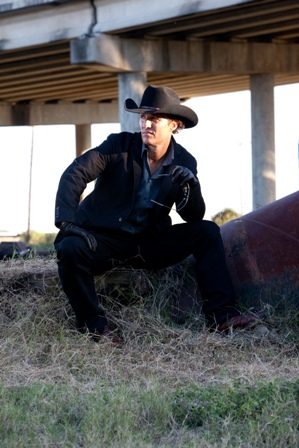CHICAGO – Patrick McDonald of HollywoodChicago.com appears on “The Morning Mess” with Dan Baker on WBGR-FM (Monroe, Wisconsin) on March 21st, 2024, reviewing the new streaming series “Manhunt” – based on the bestseller by James L. Swanson – currently streaming on Apple TV+.
Interview: Pulitzer Prize Winner Tracy Letts Unleashes ‘Killer Joe’
CHICAGO – Now that I’ve seen William Friedkin’s stunning adaptation of Tracy Letts’ “Killer Joe” with Matthew McConaughey and Juno Temple, I can only imagine what it must have been like to experience its intensity in a small theater in Evanston nearly twenty years ago.
“Killer Joe,” the second play adapted by Letts for the legendary William Friedkin after the two worked together on “Bug,” is a down-and-dirty noir about a hired killer (McConaughey) who enters the life of four morally challenged family members (Emile Hirsch, Juno Temple, Gina Gershon, and Thomas Haden Church) and turns their world upside down. The controversial film faced a battle with the MPAA that earned it an NC-17 rating for, well, we can’t even explain it to you. Sitting and talking about the play’s origins on the North side of Chicago, the MPAA, and the power of Matthew McConaughey, Letts is as intriguing and interesting an interview subject as his fans would expect him to be.
HOLLYWOODCHICAGO.COM: How did your experience on “Bug” change this? Or did it?
TRACY LETTS: (Thinks.) The simple answer to that is no. It just made more sense for “Killer Joe” to be more opened up than “Bug.” It simply didn’t make any sense for those characters [in “Bug] to travel outside of that motel room. For agoraphobic shut-ins, it’s not going to make much sense. For “Killer Joe,” all of those people are working on their various schemes and so to see them out in the world made a lot more sense. In fact, in writing the play originally, part of the challenge was to keep them all inside the trailer. Letting them loose from the trailer made a lot more sense. With both of them, there was an attempt on my part to take some of the theatrical edge off the language. It’s not especially theatrical language even in the theater. Still, there’s just enough that gives it away as a play that doesn’t translate to film. The approach was very similar and working with Bill [Friedkin] was very similar in that Bill read the screenplay and would say “great job but I got a problem here, here, and here and can we do this, this, or this?” It was very easy, very collaborative. Bill shoots what I write. There’s not a lot of mucking around with the script on the set.

Killer Joe
Photo credit: LD Entertainment
HOLLYWOODCHICAGO.COM: Are you on that set?
LETTS: I wasn’t on set for either of them, which was probably for the best. It allows them to work quicker and I respect the hierarchy. In a theater rehearsal room, the buck stops with me. But on a movie set, the director is the ultimate arbiter. I respect that very much. “Killer Joe” and “Bug” are “William Friedkin Movies.”
 Killer Joe Photo credit: LD Entertainment |
HOLLYWOODCHICAGO.COM: Right. I love the opening credits — “William Friedkin’s Film of Tracy Letts’ Killer Joe.”
LETTS: Right. He did that as far as back as “The Exorcist.” “William Peter Blatty’s The Exorcist.” That’s Bill’s doing. In fact, the Writers Guild of America didn’t like the credit. I said, “You guys are crazy. We’re getting proprietary credit and they’re giving it to us.” And they would say, “We have very specific rules.” It turns out that the paperwork had been submitted but not approved. They gave us a one-time pass on that paperwork.
HOLLYWOODCHICAGO.COM: You enjoyed the chance to open it up from its theatricality. How else is it different from the play or is it essentially the same?
LETTS: The experience of watching it is very different. “Killer Joe” is typically done in small theaters in compressed spaces. When you’ve got those five characters raging, taking off their clothes, fighting, and murdering each other on top of you. Live bodies. You can reach out and touch them. It’s a very thrilling, intimidating, scary, funny — it’s a very different kind of experience. There’s a detachment with a movie. There’s a bit of distance and that distance can be viewed as an ironic distance. It gives people an opportunity to sit back. Frankly, it’s why I prefer the theater. I like the visceral charge of people in a room. Movies, clearly, function very well in their own way. It’s not the same. The experience of it is different. I accept that and Bill accepts that.
HOLLYWOODCHICAGO.COM: Do you think it gives the cinema viewer a greater freedom to judge the characters? In theater, you’re more caught up in the action. I’ve read a few early reviews that seem to imply that you don’t like these characters and that you’re mocking them. I wonder based on what we’re discussing if that’s a product of film versus theater because there’s more distance.
LETTS: I think it is partly a product of that but I think…yes, I do think that…but I also think that the characters are so extreme and they make such bad decisions that it is easy and easier in a movie theater to dismiss them and their wants and their needs as beneath the viewer. I never viewed it that way. Bill never viewed it that way. The actors never viewed it that way. We never wanted to stand back and point a finger.
 Killer Joe Photo credit: LD Entertainment |
HOLLYWOODCHICAGO.COM: Did you get that same criticism in theater?
LETTS: Oh yeah. We did. The play was very popular in London and some of that had to do with a sense of “Look at these ridiculous Americans.” I always hated that response. What I preferred was the response of the London critics who said, “We’ve got this too.” There’s a universality.
HOLLYWOODCHICAGO.COM: I’ve also read a few people that cited certain noir inspirations — “Double Indemnity with rednecks,” someone said. Were there specific noir films or books that influenced you with “Killer Joe”?
LETTS: “Double Indemnity,” absolutely. And definitely Jim Thompson. He’s from Oklahoma, as am I. It’s very much written in that vein. One of the things about Thompson, unlike James M. Cain or a lot of the pulp writers…Thompson’s extremity. Characters do really extreme things. The violence can be outrageous and it cuts really deep. Sometimes the response to Thompson is that it’s so black and so bleak that you have to laugh. That was definitely an inspiration — this is going to be hardcore noir.
HOLLYWOODCHICAGO.COM: On that hardcore aspect, did the rating controversy surprise you or did you see it coming?
LETTS: It didn’t surprise Bill. He saw it coming. I never believed. For instance, “Killer Joe,” there’s a moment where he surprises Chris with a gun and Joe is nude. It’s important to the story to know that Joe is in this trailer and sleeping with Dottie and so he’s nude. Not to mention the potent image of a nude man with a gun. And Bill was very careful about the way he shot it to make sure that Matthew wasn’t giving a full monty and we’d get an NC-17. I didn’t know why he was worried. Matthew wasn’t worried about it. We didn’t have to shoot around for Matthew’s sake. I feel foolish now, in retrospect. We were so NOT CLOSE to getting an R rating. They questioned the morality of the entire enterprise. Therefore, it’s tough to cut around. I still look at other yard markers for some objectivity. I look at “The Girl with the Dragon Tattoo” or the “Saw” or “Hostel” movies that get R ratings.
HOLLYWOODCHICAGO.COM: The rating system is a mess but wouldn’t it be nice if the NC-17 could work the way it’s supposed to without the stigma?
LETTS: Absolutely.
 Killer Joe Photo credit: LD Entertainment |
HOLLYWOODCHICAGO.COM: I just wish it wouldn’t stop people from seeing it.
LETTS: Right. They used to release X-rated movies for adults and everybody understood it was for adults. When we first put the play up, I put an X rating on it. I said no one under 18 admitted. I didn’t want…I wasn’t trying to fool anybody. I didn’t want people to come in and get hit over the head with a chair. I wanted people to know, “You’re in for a very adult, intense experience. It’s not for kids. You can choose to see it or not see it.” Of course, in the theater, putting an X rating on it turned it into a marketing success. Doesn’t work that way in the movies. The blacklist is built in.
HOLLYWOODCHICAGO.COM: While we’re on theater, how is Chicago theater different than other places in the country? Or the world?
LETTS: It’s better. For a lot of reasons. Some of it’s economic. New York is the cultural capital of the world but, in terms of theater, it’s just about priced itself out of that business. You can’t take a risk with new material in New York the way you can here. When we first put “Killer Joe” up, our budget was $2,000. That money and every critic would come and see it, including the Chicago Tribune. You could never get that in New York.
HOLLYWOODCHICAGO.COM: Can you still get that here though? Haven’t times changed a bit?
LETTS: Things have changed because of the press. The press isn’t given the forum they once were. And some of the economic picture has changed. It’s also true that because of that and other factors like that the people here in Chicago who do theater are here because they WANT to do theater. They’re not necessarily looking at theater as a stepping stone. That happens a lot in New York and Los Angeles.
HOLLYWOODCHICAGO.COM: Real quick, running out of time, actor of the Summer — Matthew McConaughey. Why has it taken so long for him to live up to his potential and why has he been so good lately in “Magic Mike” and now this?
LETTS: He’s the perfect…the guy is such a movie star. He’s such a star in that way that movie stars are movie stars. To meet that guy, he’s so impossibly good-looking and so charming and you meet him and it’s like, “When the apocalypse comes, I want to be in YOUR camp. You’re gonna come out of it smelling like a rose.” Because of that there is a kind of timeless quality to him, which is ALL Killer Joe needed. I’ve seen Killer Joe played by a 32-year-old actor and a 60-year-old actor. As long as that actor has masculinity and sexuality and that timeless, heroic, Western quality. Matthew’s got that stuff in spades, man. Of course, he’s an evil son of a bitch. You always KNEW he was an evil son of a bitch. (Laughs.)
See just how evil when “Killer Joe” opens in Chicago on August 3, 2012. The film is now playing in some markets. And come back on August 2 for our full review.
 | By BRIAN TALLERICO |


